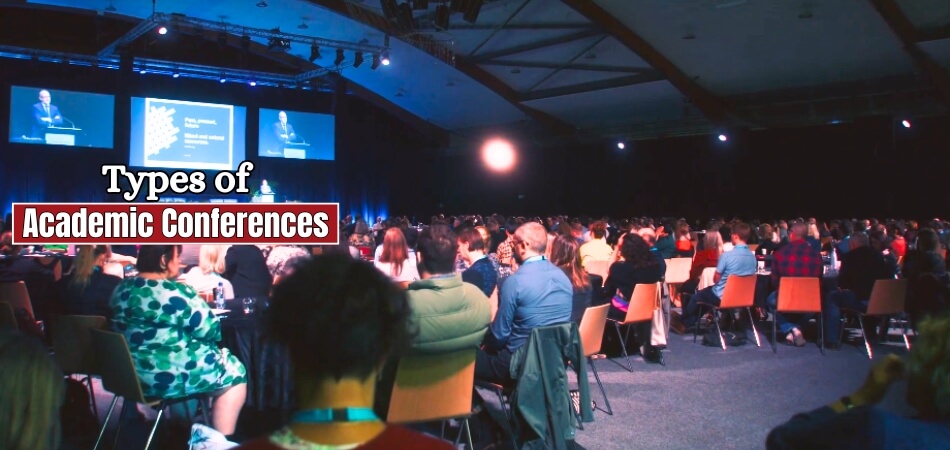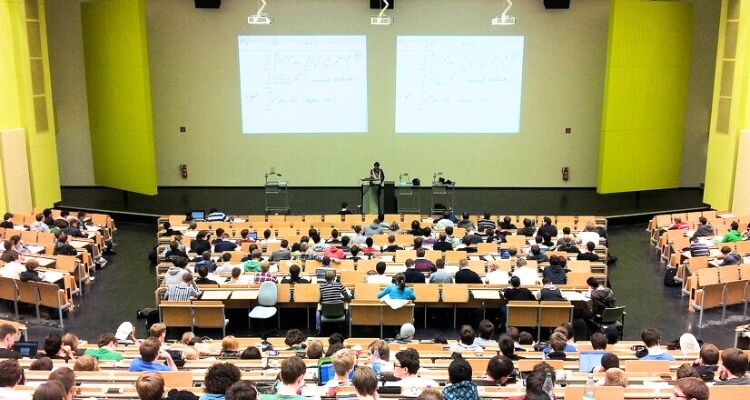During academic conferences, researchers, scholars, and professionals share knowledge, collaborate, and engage in meaningful discussions. With a variety of topics and formats, they play a vital role in academic growth and professional development, making them an essential aspect of the scholarly community.
The types of academic conferences range from research-focused events and hands-on workshops to interactive panel discussions. Each type serves a unique purpose, allowing participants to present findings, learn new skills, or gain insights into emerging trends in their fields.
Whether you’re aiming to expand your network or boost your expertise, being aware of the different formats can help you make informed decisions. Keep reading to explore the diverse types of academic conferences and how they can benefit your academic career.
What is the Purpose of Academic Conferences?
Academic conferences serve several vital purposes, making them integral to the academic community. They provide a platform where experts, researchers, and scholars can come together, exchange ideas, and promote collaboration. These events not only promote knowledge sharing but also contribute to personal and professional growth.

Knowledge Sharing and Exchange
One of the primary goals of academic conferences is the exchange of knowledge. Participants present research findings, explore emerging trends, and engage in discussions that can inspire new ideas. These interactions often lead to deeper insight and the generation of fresh perspectives in various fields.
Networking Opportunities
Conferences offer excellent networking opportunities for attendees. Meeting peers, mentors, and industry leaders help build professional relationships that can lead to collaborations, mentorships, or future research projects. Interacting with others in the field creates a supportive community, encouraging ongoing growth and development.
Skill Development
Academic conferences also focus on enhancing participants’ skills. Workshops and panel discussions offer practical insights into new methodologies, research techniques, and presentation skills. Engaging in these activities helps participants gain confidence, which is valuable for both academic and professional careers.
Feedback and Improvement
Presenting at conferences allows researchers to receive constructive feedback on their work. This feedback helps refine their ideas, improve research quality, and strengthen their arguments. It’s a critical step in the academic process, enabling scholars to enhance their work before publication or further research.
Career Advancement
Attending conferences can significantly impact career growth. They increase visibility, help participants gain recognition, and open doors to funding opportunities or collaborations. Being active in academic events reflects a commitment to the field, making a positive impression on potential employers or partners.
Ultimately, the purpose of academic conferences extends beyond research presentations; they nurture growth, build networks, and open doors to new opportunities.
Types of Academic Conferences
Each academic conference serves a particular purpose within the scholarly community. From research-based events to interactive workshops, these conferences address to diverse academic needs and interests. Being familiar with the types of academic conferences can help participants make informed decisions about which ones align best with their goals.
Research Conferences
Research conferences primarily focus on presenting new academic findings in a specific field. Participants present papers, engage in discussions, and explore new trends. They are ideal for researchers looking to gain visibility, receive feedback, and learn about advancements, making them central to academic development.
Symposiums
A symposium brings together experts to discuss a focused topic in depth. Unlike larger conferences, they promote intimate discussions, often leading to collaborative research opportunities. Participants can gain specialized knowledge, engage with subject matter experts, and contribute to detailed explorations of niche areas.
Workshops
Workshops emphasize hands-on learning and practical skills development. They are interactive, with attendees engaging in activities that teach specific techniques or methodologies. Moreover, understanding the academic all-conference framework helps participants recognize how workshops effectively bridge theoretical knowledge with real-world applications.
Roundtable Conferences
Roundtable events promote interactive dialogue among participants, usually centered around specific issues or themes. They encourage open discussions and collaborative problem-solving. This format is beneficial for gaining diverse perspectives and exploring different solutions, making it a dynamic choice for professionals and researchers alike.
Seminars
Seminars are smaller, lecture-based events that focus on a particular academic subject. Led by experts, they typically feature in-depth presentations followed by Q&A sessions. For those seeking to attend upcoming academic conferences, seminars often provide valuable opportunities to understand global perspectives.
Panel Discussions
Panel discussions involve a group of experts debating a specific topic, often facilitated by a moderator. Participants benefit from hearing diverse viewpoints, engaging in live Q&A, and witnessing real-time debates. This format offers a comprehensive analysis of complex topics through the exchange of varied perspectives.
Colloquiums
Colloquiums are informal events where scholars present ongoing research and seek input from peers. They are often smaller in scale, promoting candid feedback and brainstorming sessions. Colloquiums provide an opportunity to refine ideas and receive constructive critique, making them valuable for early-stage researchers.
Poster Sessions
Poster sessions offer a visual representation of research findings, allowing participants to engage directly with presenters. Attendees can explore various topics at their own pace, asking questions and discussing insights with researchers. This format encourages informal interaction, making it engaging and informative.
Virtual Conferences
Virtual conferences have become popular due to their accessibility and cost-effectiveness. They allow participants to join from anywhere, offering live streams, recorded sessions, and virtual networking opportunities. Despite the lack of physical presence, they maintain the essence of traditional events.
Hybrid Conferences
Hybrid events combine in-person and online participation, offering flexibility for attendees. They cater to diverse needs, allowing people to choose how they wish to attend. This format ensures wider participation while maintaining the depth and engagement of traditional events.
By choosing the right format, participants can maximize their learning, network effectively, and contribute meaningfully to their academic fields.
How to Choose the Right Academic Conference?
Choosing the right academic conference can enhance your knowledge, skills, and network. But with so many options, making the right choice can feel confusing. Here are some tips to help you find a conference that aligns with your academic and professional goals.
Identify Your Objectives
Start by considering your goals. Are you looking to present research, gain knowledge, or network with peers? Defining your objectives helps you find a conference that matches your interests, whether it’s research-focused, skills-based, or networking-oriented.
Review the Conference Theme
Review the theme to ensure it aligns with your field of study or area of interest. A well-matched theme increases the chances of relevant sessions, discussions, and workshops. Researching the upcoming international conferences can help you identify events with themes that maximize your learning opportunities.
Check the Speaker Lineup
Research the keynote speakers and panelists to see if they are experts in your field. Learning from industry leaders offers valuable insights and inspiration. Conferences with reputable speakers can also provide more networking opportunities and high-quality discussions.
Consider the Format and Location
Decide whether you prefer an in-person, virtual, or hybrid event. Location affects travel time, costs, and accessibility, while format influences engagement and interaction. The right combination ensures a comfortable and productive experience.
Review Participant Feedback
Explore feedback from past participants to gauge the conference’s quality and relevance. Testimonials often highlight strengths and weaknesses, giving you a clearer picture of what to expect. Positive feedback can increase confidence in your choice and enhance your overall experience.
Ultimately, choosing the right academic conference requires thoughtful planning and clear goals. By considering these factors, you can ensure that your conference experience is both rewarding and aligned with your professional development.
Key Characteristics of Major Conference Types
Conferences vary greatly in their characteristics, each designed to serve specific purposes and cater to different audiences. Recognizing these unique traits can help you decide which event aligns best with your goals. Here are the key characteristics of major conference types:
- Research Conferences: Focus on presenting new findings, data, and theories. These events include paper presentations, poster sessions, and expert panels. They are hubs for academic exploration, attracting researchers seeking feedback and networking with others in their field.
- Symposiums: Offer a focused setting for in-depth discussions on niche topics. Typically shorter, they feature expert-led sessions and collaborative dialogue. Symposiums promote brainstorming and are ideal for participants interested in specialized subjects.
- Workshops: Emphasize hands-on learning and skill development through interactive sessions. These events include practical demonstrations, group exercises, and role-playing, catering to professionals aiming to enhance their technical skills or learn new methodologies.
- Panel Discussions: Involve experts debating a specific topic, often moderated for balanced perspectives. Attendees benefit from live Q&A and engaging discussions, offering diverse insights on complex issues.
- Virtual Conferences: Provide remote access with live presentations, interactive chats, and recorded sessions. Cost-effective and globally accessible, they allow participation from anywhere, making them convenient for those with limited travel options.
Being aware of these characteristics can help you select the most suitable conference type for your professional growth. Whether you’re looking to present research, build skills, or engage in discussions, there’s a conference type that meets your needs.
Exploring Conference Formats: In-Person vs. Virtual
Conferences today offer a mix of formats to accommodate diverse needs. Choosing between in-person and virtual events depends on various factors like location, budget, and personal preferences. Being familiar with the differences between these formats can help you make an informed decision.
In-Person Conferences
In-person events provide face-to-face interactions, allowing for deeper networking and spontaneous discussions. They offer immersive experiences, with live presentations, hands-on workshops, and real-time feedback. Moreover, strong engagement and attendee satisfaction are considered indicators of a successful academic conference, making in-person events more fulfilling for those seeking a tangible experience.
Virtual Conferences
Virtual events offer accessibility and convenience, enabling participants to join from anywhere. They feature live streaming, recorded sessions, and virtual networking rooms, making global participation possible. While lacking physical interaction, virtual conferences are cost-effective and allow flexible participation, making them suitable for those with time or travel constraints.
Hybrid Conferences
Combining both formats, hybrid events offer flexibility by catering to in-person and remote participants. Attendees choose the experience that best fits their needs while benefiting from both worlds—immersive sessions and online access. Hybrid formats ensure broader participation and maintain the event’s engagement levels.
When exploring conference formats, consider your personal preferences, budget, and desired outcomes. Whether you prefer the energy of in-person meetings or the convenience of virtual attendance, each format has its advantages. Choose wisely for a rewarding conference experience.
What Is Discussed at an Academic Conference?
It is an academic conference that provides a platform for diverse discussions, bringing together experts, researchers, and professionals. The topics discussed depend on the theme, but they often cover a range of critical areas. Here’s what you can expect to encounter during an academic conference:
Research Findings
Conferences often showcase the latest research findings, covering innovative studies, data analysis, and theoretical advancements. Attendees discuss methodologies, results, and implications, gaining a comprehensive understanding of trends and breakthroughs within the field.
Emerging Trends
Presenters examine how new theories, practices, or technologies are shaping the field. Discussions focus on potential benefits, challenges, and future developments, enabling attendees to stay updated and adapt to changing dynamics.
Case Studies and Best Practices
Real-world case studies provide practical insights. Presenters share successful strategies, challenges faced, and lessons learned, offering attendees ideas that can be applied directly to their work to enhance professional effectiveness.
Policy Implications and Ethical Issues
Experts address current regulations, ethical standards, and their broader impact on research, practice, and society. Discussions delve into responsible research practices and the ethical complexities of implementation, offering a holistic view of these issues.
Workshops and Skill Development
Workshops focus on hands-on learning, offering training in specific tools, techniques, or methodologies related to the field. These sessions provide real-world applications and encourage skill enhancement among participants.
Future Research Directions
Attendees discuss unexplored areas, emerging questions, and gaps in existing research. These dialogues contribute to shaping future research agendas and promoting collaborative projects, driving the field forward.
Academic conferences provide a wealth of knowledge, from innovative research to practical applications and ethical considerations. Engaging in these discussions not only broadens perspectives but also enhances professional growth. Whether you’re a researcher or a professional, these conferences offer valuable learning opportunities.
Frequently Asked Questions
When exploring the types of academic conferences, it’s natural to have additional questions. Here are some common queries that often arise, offering more insights into academic conferences and their dynamics:
Are Academic Conferences Only Meant For Researchers?
No, academic conferences are not just for researchers. Professionals, students, and educators also attend these events. Conferences aim to share knowledge, foster discussions, and provide networking, making them suitable for anyone looking to engage in academic growth and collaboration.
Do All Types Of Academic Conferences Require A Presentation?
Not all types of academic conferences require presentations. While research conferences often focus on presenting findings, others, like workshops and panel discussions, encourage attendance without presenting. This flexibility makes it easier for attendees to learn and participate without pressure.
Can You Attend Academic Conferences As A Student?
Yes, students can attend academic conferences. Participation helps them understand research trends, gain practical exposure, and build networks with scholars. Many conferences offer discounted rates for students, encouraging their involvement and fostering academic growth beyond traditional classroom settings.
Do Virtual Academic Conferences Offer Networking Opportunities?
Yes, virtual academic conferences include various networking options. Attendees can join live chats, participate in breakout sessions, or engage in Q&A discussions. Despite the lack of face-to-face interaction, online platforms provide a structured environment for meaningful networking and collaborations.
Are There Academic Conferences Focused On Interdisciplinary Studies?
Yes, some academic conferences focus on interdisciplinary studies, encouraging collaboration across different fields. They offer a platform for researchers, educators, and professionals to explore new ideas and intersections, making them valuable for those interested in diverse perspectives and innovative approaches.
Conclusive Words
Academic conferences are valuable platforms for learning, networking, and sharing ideas. Whether you are an experienced researcher, a professional, or a student, learning about the types of academic conferences can help you find the best fit for your interests and career goals.
With options ranging from research-oriented events to hands-on workshops, each type offers unique experiences and growth opportunities. Being aware of the format, topics, and focus areas can enhance your overall participation and outcomes.
So, if you’re looking to expand your knowledge or make new connections, exploring the different types of academic conferences can be a great start. Choose wisely, engage actively, and take advantage of what each event has to offer.







